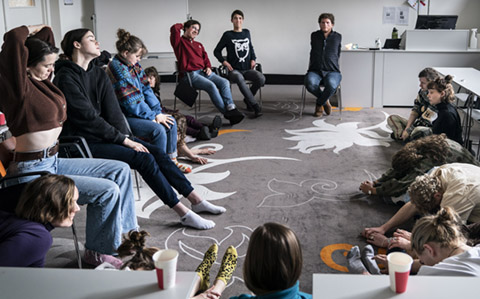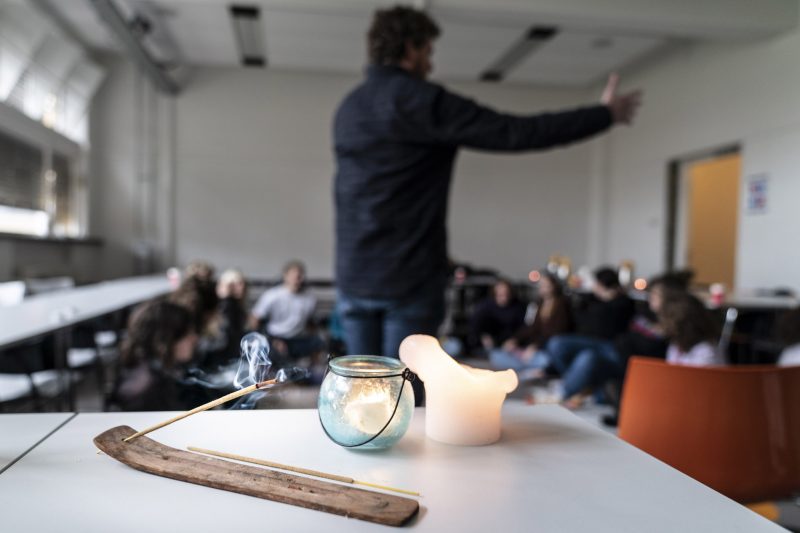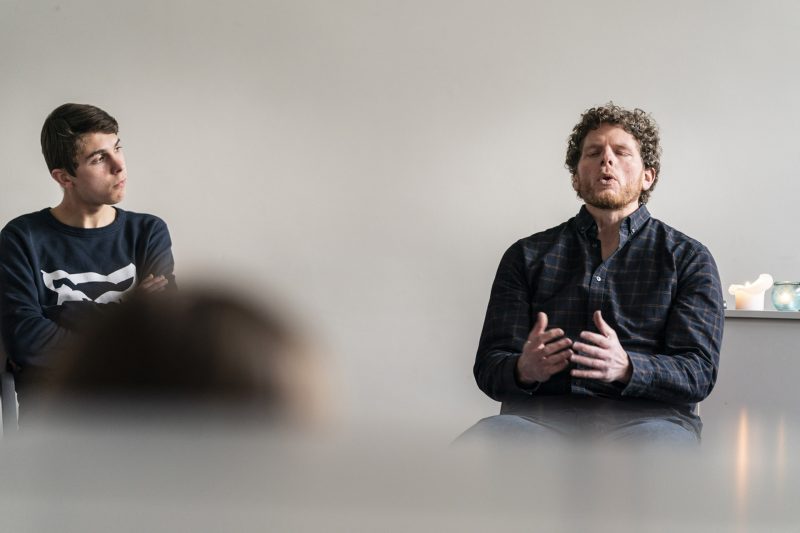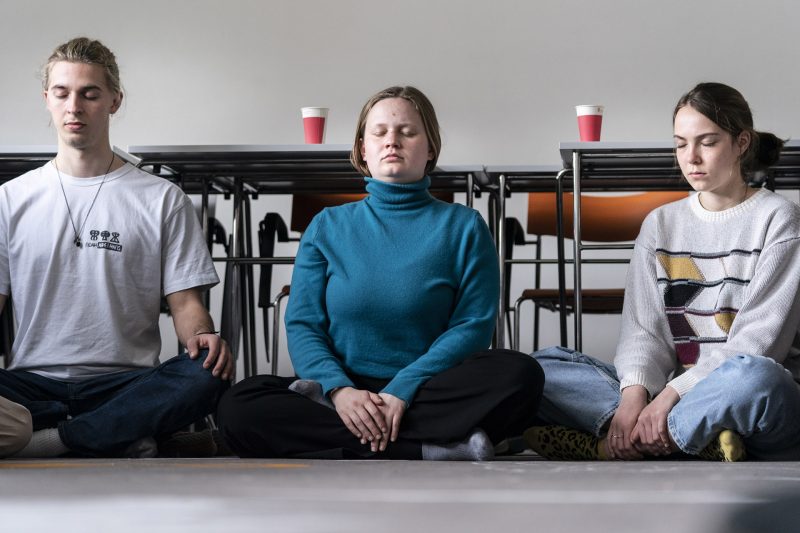
Chris May meditates in class
Keep calm and relax your mind
Sarah was a little skeptical. She had tried meditation before, because it looked like a promising method to improve her mental health. But the practice felt vague and overly spiritual, so she gave up.
Then, the student of liberal arts and sciences enrolled in a biopsychology course taught by Chris May. The assistant professor invited her and others to meditate and this time, the experience was quite different.
‘The guided meditation led by Chris took place at the end of the lecture and was completely optional. He asked us a few questions related to gratitude, which allowed us to focus on our personal responses and promoted positive thoughts. I thought it was very nice, because he didn’t talk about anything spiritual or too specific’, she says.

Photos by Reyer Boxem
Teaching tool
After that, Sarah says, she was ‘inspired’. Now, she tries to meditate regularly. ‘After Chris’ guided meditation, I looked for similar meditations online. Sadly, I often don’t quite find what I’m looking for.’
It makes me feel like my brain can calm down from overstimulation
For her, meditation is a moment of calm that helps her relax more than any of her other hobbies. ‘It makes me feel like my brain can calm down from overstimulation.’
Many other students in May’s biopsychology class have experiences similar to Sarah’s, because he meditates with his students all the time. ‘I use meditation as a teaching tool to make academic content more memorable’, he explains. ‘But I also want to expose my students to something that may be helpful to them.’
Self-compassion
After finishing his PhD in biopsychology, May started researching different types of meditation. ‘Meditation is something that I enjoy investigating professionally as well as engaging in personally. I meditate daily, currently for half an hour a day.’
May – like his students now – discovered meditation through a course he took while he was at university. It’s been a part of his life ever since. ‘The primary thing I have noticed with regular practice is an increase in self-compassion. I’m kinder to myself, better able to situate worries in a larger context, and less likely to take all of my thoughts quite so seriously.’
In his own research, May found that fifteen minutes of meditation a day has similar effects on people as a short vacation. Both can promote well-being and mindfulness.
How does that work? The basis for meditation practice is the structure of our nervous system, May explains. ‘Normally, when people are stressed, they alleviate that by stopping to activate the sympathetic nervous system, the part of our brain that is active under stressful conditions and prepares us for “fight or flight” responses. That’s what we typically do; we try to distract ourselves.’

Photos by Reyer Boxem
Health benefits
But the very architecture of our nervous system suggests another way. You can also deliberately activate its second part: the parasympathetic nervous system. It is active in calm rest conditions, conserves energy, and regulates essential body functions. ‘One way to do that is through meditation’, May says, leading the body to a state of relaxation and rest. This essentially slows down our heart rate and breathing, and lowers blood pressure.
Even if the research doesn’t pan out, you’re still helping people
The health benefits this brings are many. ‘Physiologically, well-known research showed how meditation can impact the ends of chromosomes, which in turn reduces cellular ageing’, he says. ‘It also has a positive effect on conditions such as hypertension.’ There’s also positive psychological effects: people are less stressed and experience more positive emotions.
More recently, May has been researching the interpersonal effects of meditation. He found that students may be positively impacted if their teachers meditate. Children do better if their parents meditate. ‘But what I love most about this research is that even if it doesn’t pan out in terms of a publication, you are still helping people.’
Fifteen minutes
So students in May’s class get a chance for a fifteen-minute meditation. ‘Enough to get a feel’, he says. ‘More can be quite laborious at the beginning.’ Most students are enthusiastic and will give it a go. Others use the time for a power nap.
May uses Focused-Attention Meditation or Loving-Kindness Meditation, both methods he has been researching himself. ‘I ask them to address wishes such as “may you be well”, “may you be happy”, “may you be free from suffering” to different persons.’
Students will direct these wishes to a person they deeply care about, but also to someone they have a conflict with or even a larger group such as the entire classroom. ‘You’re doing two things here. The first is practising creating this feeling that people should be well – you’re developing your strength in the muscles of compassion. The other one is practising the willpower and inclination to be kinder, especially through wishes for people you would normally not be affectionate to.’
Afterwards, they may report feeling less stressed and more relaxed, while others struggle, saying they couldn’t control their minds.

Photos by Reyer Boxem
Long practice
If the last thing happens, that’s okay, May says. ‘You don’t feel like you have control in your head. But the positive effects tend to come in with long practice. It’s unlike medicine, which is something you take and directly feel better.’
You’re developing your strength in the muscles of compassion
There’s a lot of variation in how people respond to meditation, just as with sports. ‘There are a ton of different sports you can do. I’ve tried running for years, but that’s just not for me. I like biking. You might find one kind of meditation is not for you, but maybe another one is.’
May even offered his meditation outside of the classroom, because of Covid. ‘We felt a lot of us students didn’t have the tools and skills to have a less stressful and more balanced lifestyle’, says Hannah Matthiesen, chair of liberal arts and sciences study association Caerus. Many have continued to this day.
Calmness
That also has something to do with May’s personality, Hannah says: ‘He is a very calm and vibrant person. He already radiates this meditative calmness and many students value his expertise.’
Sarah would recommend meditation to anyone. ‘It can be very helpful with getting better control over your own thoughts and focus. And it’s relatively easy to access.’
For May, it’s about doing something people don’t normally do. ‘It’s an invitation to spend time with no purpose other than just sitting there. Research shows that there is reason to give meditation a go, so just try it out for yourself.’